 Social and Relationship capital
Social and Relationship capitalAt Tata Steel, we believe that to sustain a successful business, it is imperative to build long-term relationships based on mutual trust, respect and benefits. It protects the organisation through business and economic cycles. Our relentless pursuit towards meeting the emerging needs of our customers, creating of value for our suppliers and driving inclusive growth for our communities we serve, has contributed to creating significant social and relationship capital.
Lives reached through CSR initiatives
Customer Satisfaction Index (Steel) (out of 100)
Critical suppliers assessed on Responsible Supply Chain Policy
Impact on SDGs
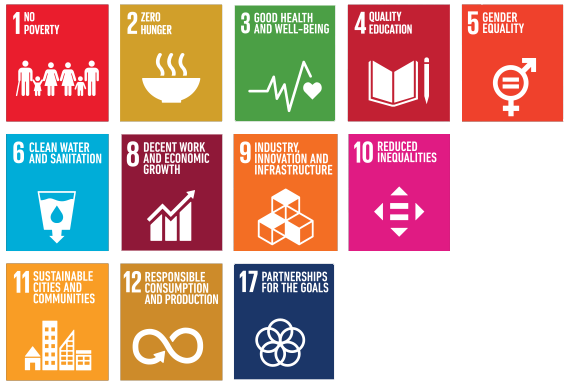
Business growth
Product and service quality
Long-term profitability
Greater stakeholder engagement
Technology, product and process innovation
To meet our objective of becoming the industry leader in steel and insulating revenue from steel cyclicality, we are going beyond traditional products by offering a range of customised services, solutions and value-added products across existing and new customer segments.
Tata Steel has been focussing not only on existing but also on latent and evolving needs of its customers across B2B (Business Accounts), B2C (Individual Consumers) and B2ECA (Emerging Corporate Accounts) by offering differentiated products, services and solutions.
A challenging year such as FY 2020-21 required a different approach towards our customers – of empathy and support through innovative engagement. FY 2020-21 became a year of forging stronger relationships with our customers and of renewed commitment to quality both in terms of product and service delivery. Further, our multiple digital initiatives emerged as a big gamechanger during the pandemic and enabled us enter unserved territories, creating opportunities to serve new customers and new markets. FY 2020-21 therefore was dedicated to forging stronger relationships with customers and renewing our commitment to quality both in terms of product and service delivery.
COMPASS aims at digitally enabling the supply chain to maximise visibility for customers and OTIF (on time in full) to better track inventory and supply chain from production to last-mile delivery
Launched e-DRIVE, a digital platform developed in-house, to transition tech-support activities traditionally involving high physical engagement to virtual medium using 3D viewer software and Microsoft tools
Launched #Converse to Construct-Conversations that build Tomorrow, a platform to engage with different stakeholders of the construction sector to share and co-create ideas that would enable adoption of faster, sustainable and modern construction practices in line with global benchmarks
DigECA, a digital solution for ECA business, created real-time, segmental visibility of sales for channel partners and end customers
Tata Astrum Super, the premium brand of Hot Rolled Cut to Length Sheets, completed two years, recording 30% growth; it aims to address the pain points of the fragmented mix of comparatively small retailers and fabricators
Conducted monthly Safety Workshops and Webinars on Best Practices in MSME space, aligned with the commitment of safety and customer engagement, by leveraging the digital medium during the COVID-19 period
Enhanced our reach through e-selling platform, Aashiyana by acquiring customers who would otherwise have not visited the offline stores; Aashiyana clocked ₹726 crore in revenue in FY 2020-21, more than doubling its year-ago performance
Launched Tata Basera 2.0, the Tata group level synergy programme for individual home builders; Tata Power Solar, Voltas Beko and Tata Cliq have been on-boarded on this programme
Brought the entire distribution channel on one platform, Sampoorna, by creating a common interface for channel partners, their workforce and dealers; 48 distributors of Tata Tiscon and their workforce of 700 ASOs (Area Sales Officers) and BMs (Business Managers) were included
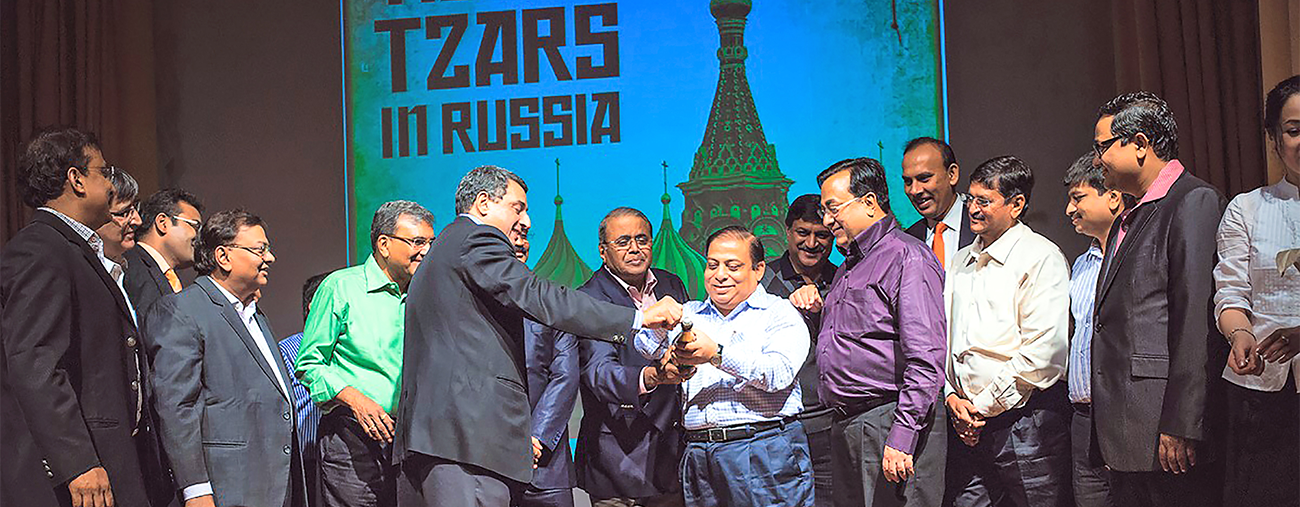
Fostering strong and long-lasting relationships with customers
FY 2020-21 was a year of extremes from a demand perspective.
To overcome the challenges posed by the pandemic, we leveraged our digital platforms to strengthen our relationships with key customers in strategic segments through several Technical Cross Learning sessions
We also transformed Customer Service Team (CST) approach of nurturing the automotive relationships into a digi-intensive engagement forum
By developing API grades upto X70 from the Kalinganagar plant, Tata Steel has been able to make significant inroads in the Oil & Gas segment by securing approvals from major oil producing companies
Tata Steel increased its share of business with major national players in the Lifting & Excavation and Pre-Engineered Building segments by enriching the product offering and increasing engagements
Collaboration with worldsteel (through ConstructSteel forum) to increase steel intensity in construction in India.
Golden Home Consumer programme – Tata Tiscon’s loyalty and advocacy programme for individual house builders (IHBs) transformed itself into a digital avatar during COVID-19, reaching out to 8,000+ consumers and getting recognised for customer-centric excellence in business leader of the year award. A Golden Home Consumer is one who buys 3 tonne of Tata Tiscon within a year for building their house
Tata Tiscon provided safe shopping experience for consumers, increasing its footprint in the rural hinterland through active engagement with the mason community under the MITR programme. The programme has 24,000+ masons who contribute to 30%+ volume for the brand
Celebrating 20 years of its launch, Tata Shaktee reached out to over 2,000 farmers across the country via physical and digital meets conducted on Kisan Diwas. Fabricator loyalty programme, Shakteeman also saw its highest enrolment of over 8,000 fabricators, achieving ~8,000 tonne of sales. The brand connected with over 5 crore people through various campaigns on social media
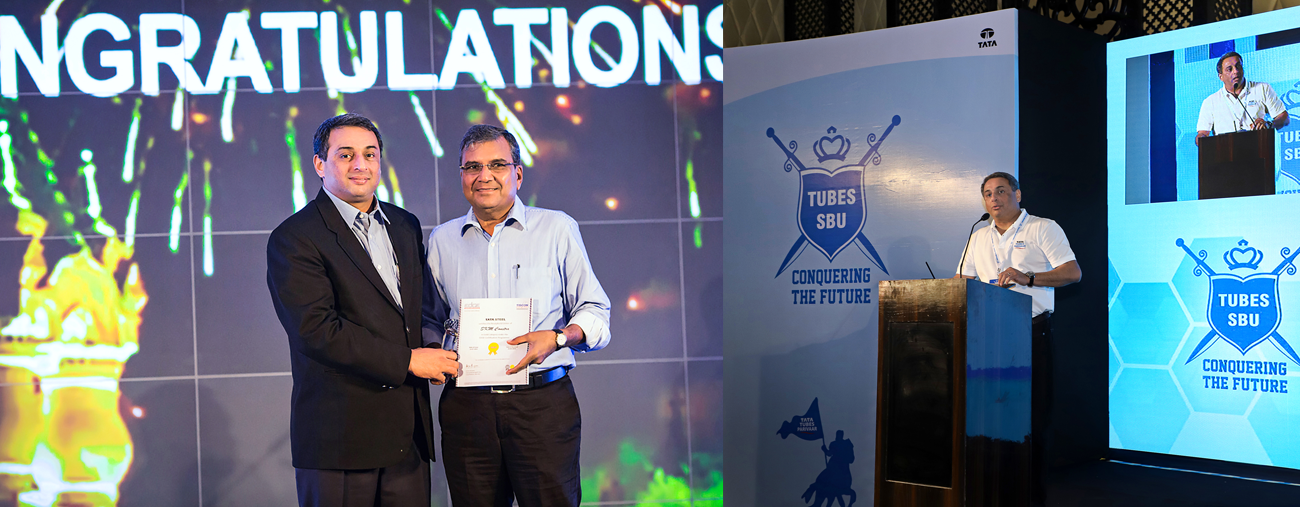
Felicitating channel partners
With over 152 customer engagement initiatives conducted virtually to create over 18,000 touchpoints, ECA brands continued to focus on value creation and building on customer relationships.
Launched new Coated Brands from Tata Steel BSL – Galvanized Plain Regular Spangle, Galvalume and Colour Coated – which are Restriction of Hazardous Substance compliant
For entry into new product and market segments and which promote sustainability in line with the changing consumer requirements
Continued to nurture customer relationships through the Ecafez online platform where several online training workshops, events with the Bengal Chamber of Commerce & Industry (BCC&I), Indian Chamber of Commerce (ICC), quality-focussed webinars, micro-segment specific engagement programmes like 'Panorama' (for panel industry) and 'Solarix' (for solar industry) were conducted
In the past few years, Tata Steel has launched various innovative products and services, with two major offerings: Tata Pravesh Steel doors and windows, and Nest-in, a smart steel-based modular construction solution.
Tata Pravesh: Tata Pravesh came out with a comprehensive COVID Care programme for all its distributors and 250+ privilege dealer partners. It also carried out a nationwide sanitisation exercise following WHO guidelines for safety and business continuity of the channel. FY 2020-21 also witnessed the launch of Tata Pravesh’s new brand campaign, 'Akela hi Kaafi hai', with the widely loved Gajraj Rao as the celebrity endorser. Tata Pravesh installations grew 40% in FY 2020-21 over FY 2019-20
Nest-In: Nest-In deploys various approaches to engage with customers at all stages of the customer life cycle. Orders worth ₹104 crore were received during the year, up ~14% over the previous year. Steps have been taken to further strengthen customer relationships by leveraging digital tools
GalvaRoS (GPRS), Galvanova (GL) and Colornova (CC)
Long-term profitability
Technical knowledge transfer and capacity building for relevant partners
Supply chain sustainability
Greater stakeholder engagement
Local sourcing of labour
Maintain cost leadership and care for people across our supply chain through partnerships with our suppliers.

Suppliers' Sustainability Expo
The SRM programme is aimed at building collaborations with strategic vendors for managing and enhancing value delivery through supplierled innovation. During FY 2020-21, multiple sessions were conducted on new and emerging technologies and processes across various improvements areas such as quality, delivery, productivity, safety and sustainability. The sessions, conducted with our strategic vendor partners, helped create value for both Tata Steel and its supplier partners while creating a value pipeline.
A new structured programme of CEO to CEO connect was started in FY 2020-21 in which CEO & MD and the Senior Leadership team of Tata Steel interact with global CEOs and leadership team of select strategic suppliers. The objective is to strengthen business relationships, share future business plans and identify high-impact innovation ideas which can be pursued collaboratively.
Developing supplier partnerships through long-term projects in the imported coal value chain is critical for reducing the overall cost of production in the long run. Understanding strategic plans of key suppliers and creation of mutually beneficial products have helped maximise the supply of coal that has higher value-in-use (VIU) and is most suitable for our coke plant configuration. We have ensured raw material supply security by developing new relationships in Russia, Canada and Indonesia. We have also created alternative supply chain models for coking coal, enabled by vendor-managed inventory at Indian ports. This has facilitated supply chain security, credit enhancement and optimisation of inventory, leading to efficient management of complex multi-site operations. The four key areas for collaboration focusses on carbon capture, usage and storage, coal quality optimisation, mining and beneficiation technology and processes, and ironmaking and steelmaking technologies for improving Tata Steel’s sustainability.
Our Responsible Supply Chain Policy (RSCP) aims at encouraging supply chain partners to integrate sustainability principles in their decisions and processes in line with Tata Steel’s commitment to sustainable business practices. The Policy focusses on sensitising suppliers about the need to implement sustainable business practices and inculcate the same culture in their supply chain. The Policy is guided by four principles: Fair Business Practices, Health & Safety, Human Rights, and Environmental Protection. We started the sustainability assessment journey with our critical vendor partners. More than 200 suppliers were assessed in FY 2020-21 with a spend coverage of around 33%.
In view of the highly dynamic and everchanging business landscape impacted with the pandemic, global geopolitical challenges, there is a high risk of impact on the Tata Steel supply chain and increased risk for disruption. While Tata Steel has always worked on localisation, in FY 2020-21 Tata Steel has increased the efforts and focus on indigenisation and localisation across multiple categories of buy like raw material spares, and process consumables. A detailed roadmap for indigenisation has been created for the next three years.
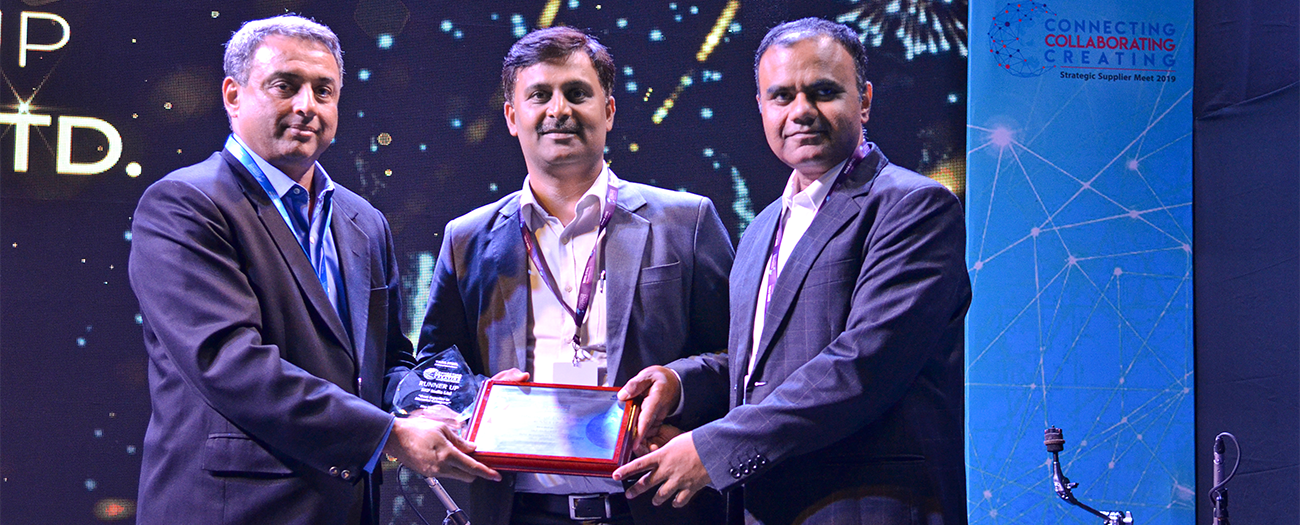
Strategic Supplier Meet
The vendor development programme and vendor capability advancement programme aims to partner and support suppliers to enhance their capability through continuous improvement, creating a competitive vendor base across Tata Steel. During FY 2020-21, we initiated 32 vendor development programmes, which led to improving vendor capability through a structured approach, value creation and operational improvements in productivity, plant availability, reduction of rework, improved delivery compliance and higher quality of supplies. Moreover, the safety performance of suppliers also improved. Vendor capability and skill development training programmes in TQM, finance, specific trade-related skill development, operational excellence, ethics, safety, cost management and sustainability covered 844 suppliers. Over 12,000 contracted workforce were trained under the skill certification programme by the Capability Development team.
We have reached a 100% certified contracted workforce through our skill certification programmes. Skilling 2.0 was initiated in FY 2020-21 focussing on developing a multi-skill workforce. Further, to support local communities and encourage the inclusion of marginalised sections of the society, we help develop entrepreneurial capabilities by creating positive differentiation through our Affirmative Action (AA) programme. Nearly 33% of our supply chain partners are local, of which 71 are AA suppliers and DP vendors (displaced due to greenfield project).
During FY 2020-21, we ensured continuity of vendor operations through necessary interventions across states. We also ensured that no pay cut was instituted by the local service providers and the contract workforce was paid as per agreed terms. Assistance was provided to vendor partners from across India, by ensuring availability of vehicles, racks and issuing letters for hassle-free transportation.
Many digital initiatives such as Digi-Bill (e-submission of Invoices), digital platform for paperless transactions for inbound material delivery, Margdarshak, for tracking and re-routing vehicles, among others were deployed to manage the supply chain and ease the transactions carried out by our suppliers.

We will cover more suppliers under the sustainability assessment programme in FY 2021-22 and then categorise our supplier partners in 5 major bands – Basic, Improving, Established, Mature and Leading. We also intend to identify key ESG risks in supply chain and collaborate with partners for risk mitigation and integrate ESG performance of supply chain partners in procurement decision-making
More collaborative initiatives on responsible procurement will be undertaken with our key suppliers such as refurbishment of equipment through strategic engagement with MRO vendors and multiple initiatives on reduced carbon emission
We are actively working on the implementation of innovative and structured financing solutions such as Receivable Purchase Agreement with major suppliers and ramping up vendor-managed inventory coverage
Greater stakeholder engagement
Drinking water
Articulating globally relevant change models to address core challenges to the significant and lasting well-being of communities proximate to our operations
Tata Steel serves communities particularly the most marginalised and voiceless sections across more than 4,500 villages in nine districts of Jharkhand and Odisha. In alignment with our core philosophy, we envision an enlightened, equitable society in which every individual realises his/her potential with dignity. This vision is enabled through the work Tata Steel’s Corporate Social Responsibility team does with tribal and excluded communities to co-create transformative, efficient, and lasting solutions to their development challenges.
During the world’s fight against the pandemic, we stood by the most underserved communities, directly reached a million people across 24 states of India.
| Goals | Initiatives | Achievements |
|---|---|---|
|
Meeting material, information and well-being deficits |
#ThoughtforFood |
27.43 lakh meals served across all locations 48,000 ration and hygiene packets distributed till date across the three districts of Kolhan division (Jharkhand) 324 donors have contributed `72.24 lakh |
|
#StitchinTime |
1,01,659 masks produced till date 194 households were engaged in mask making 100 individuals from prison have contributed by making 16,500 masks `9.5 lakh disbursed as income |
|
|
#DigitalBridges and DigitalBridges 2.0 |
Digital Bridges 1,68,167 people reached out through Mobile Medical Units (MMUs), tele-consultations, on-site trainings, expected delivery date tracking Digital Bridges 2.0 72,830 individuals from 244 Gram Panchayats across Jharkhand and Odisha reached out through direct digital conversations and indirectly, with information and support 6,544 people screened for home/government quarantine |
|
|
#FarRishta |
65,201* women, children and men reached till date 4,297* volunteers have shared their time and talent till date* 20 states/Union Territories and 41 cities *Repeat engagement / Repeat volunteers |
|
|
#FriendinNeed |
578 individuals called the befriending service till date 309 callers sought emotional support on stress and depression 202 callers were citizens who needed extended services |
|
|
#HopeSprings |
40,828 returning workers reached with warm meal, ration and hygiene kit on National Highway 33 2,500 returning workers provided with dry ration packets at Ganjam district of Odisha `9.83 lakh raised through generous contributions by 47 donors 1,712 women, men and children provided with medical assistance |
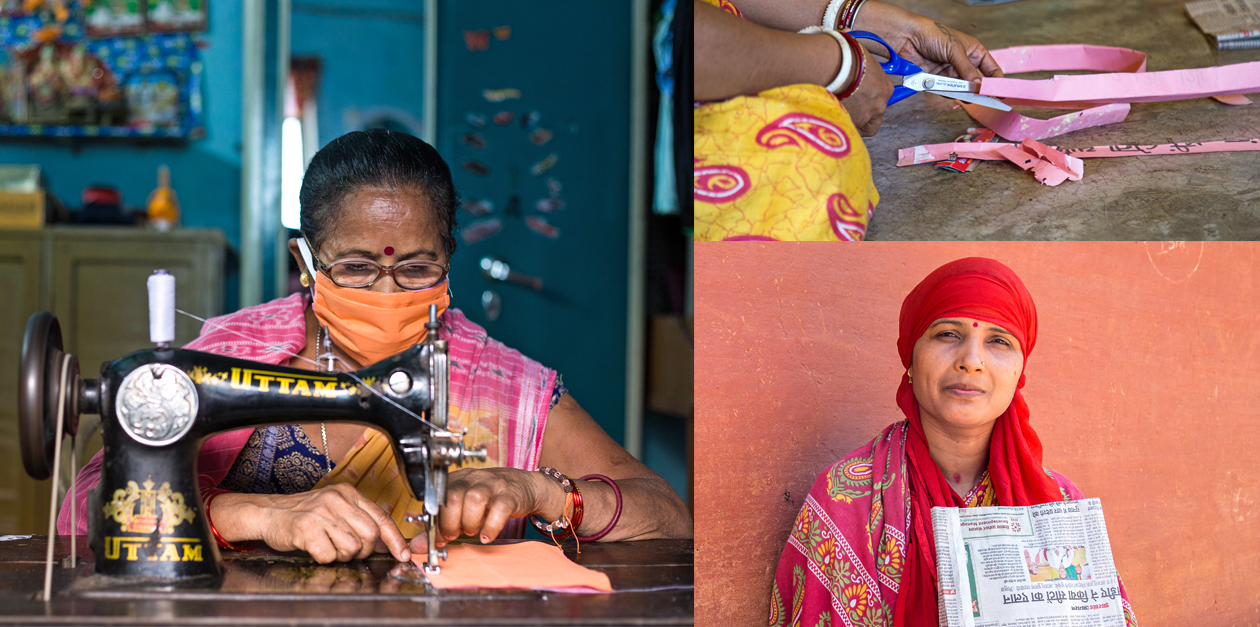
| Goals | Initiatives | Achievements |
|---|---|---|
|
Creating economic opportunities |
#FromtheFarm |
16,333 kg of vegetables distributed 1,566 orders received on Zomato and Swiggy including some offline orders 203 farmers currently supported through the value chain `7.32 lakh disbursed as income till date |
|
#CashforWork |
2,860 households reached `27.15 lakh income disbursed through creation of kitchen gardens, wall-writings, paintings, paper bags, musical instruments and woodcrafts |
|
|
Establishing platforms to amplify impact |
#StrongerTogether |
10,562 returning workers surveyed across 11 blocks of East Singhbhum by 9 partner organisations of District Response Coordination Group Over 71,500 lives have been reached through the healthcare services provided in the hospitals with support of Tata Steel CSR and the same is included in the overall lives reached under #CombatCovid19 programme |
Tata Steel continued with the community development programmes and CSR initiatives, despite restrictions due to the COVID-19 pandemic. The Maternal and Newborn Survival Initiative (MANSI) continued to fully support expecting mothers as well as new-born and infants. Healthcare services were available to those with chronic ailments. A lockdown learning model was devised for the Thousand Schools programme for rural children, especially girls facing challenges with access to digital devices and networks, potentially driving increased dropouts and permanent learning disruption. The model equipped volunteer and government school teachers with digital access who then teach children in small COVID-safe clusters using customised teaching learning material thus saturating 90% of children in eight blocks and 60% in 11 blocks. Farming communities were supported to continue their livelihoods. Technical institutes operated by Tata Steel continued to function with online classes ensuring the vocational training available to youth continues unabated.
Signature Programmes: Actualise change models which address core development gaps in Jharkhand and Odisha, while being replicable at a national scale
| Initatives | Impact | SDGs |
|---|---|---|
|
A society where the health and survival of women and children before, during, and after childbirth is a priority reaching out to 58,000 people |
Reached 56,545 mothers and children enabling reach of ASHA (Accredited Social Health Activist) system to their home Operation Sunshine, the digital intervention of project MANSI (Maternal And Newborn Survival Initiative) enabled tracking of 3,101 high-risk cases till Q4FY2021. Amidst the severe restrictions due to pandemic, we were able to successfully address 86.23% of the high-risk cases whereas 9.55% were cases under observation. This became possible with a combination of physical and digital means of operation Sexual and reproductive health knowledge to 3,770 adolescents |
|
|
A society where all children go to school and have access to high-quality education to prepare them for a successful future covering 19 blocks of Jharkhand and Odisha |
Over 2,51,000 children's lives impacted through Education Signature Programme The Lockdown Learning Model, devised during pandemic to provide learning support to the children reached over, 1.36 lakh children A first of its kind non-financial partnership with the University of Turku, Finland is in place from February 2021 onwards to create learning content, combining best-in-class Finnish methods and the local context of our children 32,000 members of community formed 2,346 Child Rights Protection Forums. Communities run 54 Community Education Resource Centres Odisha blocks reaching 4,600 youth and a footfall of 23,000+ people Complying to Right to Education Act, SMCs have made School Development Plans (SDPs) ratified through Gram Sabhas to be part of Gram Panchayat Development Plans (GPDPs) worth ₹100 crore. ₹54.80 crore has been mobilised by the community through the Panchayats with a purpose of rejuvenation and upgradation of school facilities enabling an environment for improvement in education |
|
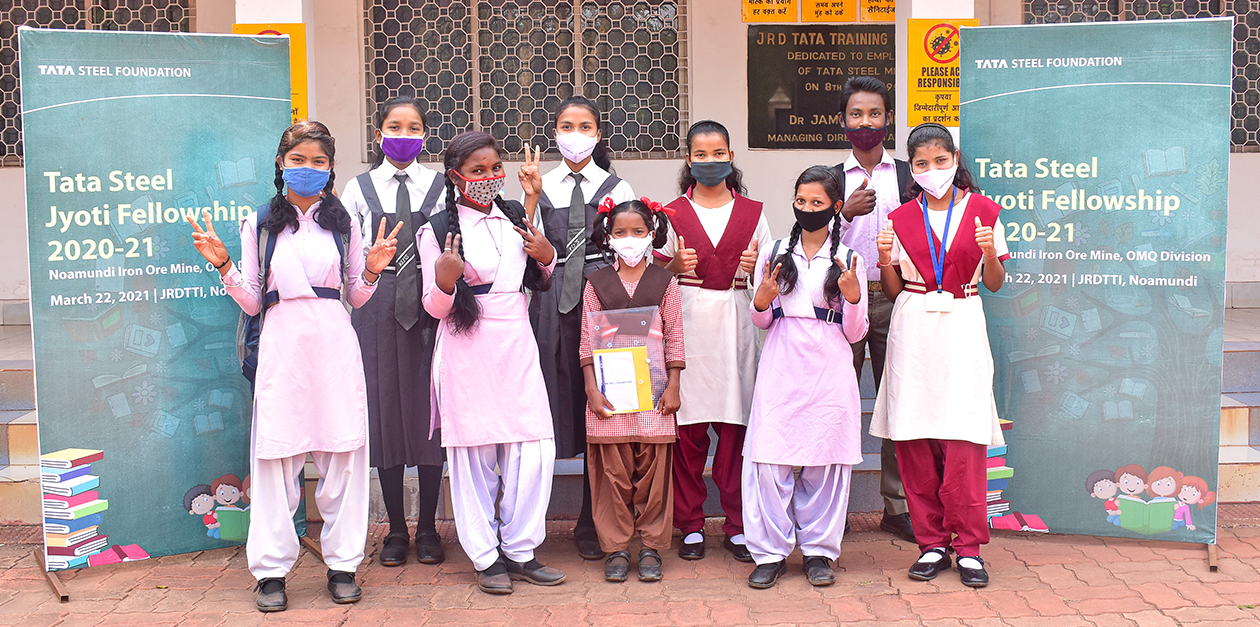
| Initatives | Impact | SDGs |
|---|---|---|
|
Empowered tribal communities with voice and agency to lead their development agenda, residing in an ecosystem that recognises and appreciates tribal values and living reaching out to six tribes |
Samvaad ecosystem reached 28,180+ people in FY 2020-21 Samvaad 2020 went bridgital to keep the dialogue going with its YouTube channel having 10,300 viewers, participation of 157 tribes, 25 Indian states and four nations Through Aatithya (Tribal Cuisine), Jamshedpur citizenry enjoyed delicacies from home cooks belonging to 12 tribes across 10 states in collaboration with Indian Hotels Company Limited and delivery partner Zomato marking sales of `1 Lakh over five days of the Samvaad Conclave Rhythms of the Earth, the Samvaad Music Collective released the musical compositions Birsa Ker Raij curated in collaboration with eminent folk singer Padma Shri Mukund Nayak and Abua Disum Abua Raij (Our Land, Our Rule) marking the statehood day of Jharkhand During the COVID-19 pandemic, most of the language centres went digital to continue the language learning. 510 language learning centres are operational reaching 16,947 language learners |
|
|
A vibrant Jamshedpur - Kalinganagar corridor where local communities participate in and lead a significant enhancement in their social, natural and cultural capital reaching out to 71 panchayats and 10% of its population (92,000 households) |
Under the Development Corridor project, Government PRI representatives, along with Tata Steel Foundation succeeded in organising its first-ever Digital Gram Sabha in four panchayats recording presence of 80+ people on digital medium and ~300 people in person. The 'threat of COVID-19' helped to cocreate an opportunity for devising a digitised platform for connecting the unconnected and secluded. One of the Gram Sabhas witnessed more than 50% women’s participation |
|
Proximate Community Development (PCD) Programmes: Enable sustainable and significant betterment in the well-being of communities proximate to our operating locations
Addressing needs of communities and key
stakeholders by focussing on:
(a) ensuring access to comprehensive
primary healthcare,
(b) sustained
availability of safe drinking water,
(c) enhancing household incomes through
agriculture, its associated activities and
skill-based training for employment and entrepreneurship,
(d) enabling basic
school education (at least till grade
10) for all children as well as supporting
education through scholarships to
meritorious students,
(e) addressing urban
child labour and re-introducing children to
the educational mainstream,
(f) improving
nutritional levels of families as well as that of children in public schools,
(g) sensitisation of society towards Persons
with Disabilities (PWDs),
(h) nurturing
sporting talent among the youth and
(i) engendering community self-reliance
by deepening grassroots governance
mechanisms in villages particularly
focussing on women leaders
Over 0.35 million lives have been reached through our PCD programmes in FY 2020-21. This is apart from what is achieved under #CombatCovid19 initiative
Over 1 million people provided with primary healthcare services across the operating locations of Jharkhand and Odisha
An increase of `65,000 in 24,693 farmers' incomes has been enabled through several agricultural related livelihood interventions
21 water harvesting structures constructed largely for agricultural use and partly for domestic use
848 children covered from ~3,000 target numbers with 316 mainstreamed till date (187 mainstreamed in FY 2020-21). 13 residential and non-residential facilities in Jamshedpur functioning under Masti Ki Pathshala (MKP). Pandemic brought difficulties for some children and to enable quick support to them 'Children of The Streets' programme launched under MKP which now reaches to 87 children in three centres. In overall MKP programme, 40% children are female
2,540 SC/ST students supported for their education in form of Jyoti Fellowship and Tata Steel Scholarship
Construction of the Mid-day meal kitchen in Chaibasa, West Singhbhum has been completed and shall be handed over to Annamrita Foundation for operations and management. It will cater to ~63,000 school-going children of West Singhbhum district
1,576 youth enrolled in placement and self-employment linked skill enhancement programmes, out of which 290 completed the training and 172 youth placed/self-employed. Due to pandemic, placements were delayed and are expected to be completed in early FY 2021-22
4,173 youth enrolled in capacity building trainings and 3,232 youth completed the trainings
2,303 persons reached through Sabal Centre and various disability linked programmes
On February 26, 2021, the contributions over the past 3 years of SABAL – Centre for Abilities towards honouring the spirit and talent of persons with disabilities were recognised by the Deputy Chief Disability Commissioner, Government of India and the State Disability Commissioner, Government of Jharkhand
Over 80,230 people were provided drinking water through various facilities
~12,000 women reached under empowerment programmes through Self Help Groups
3,770 youth engaged through different sports activities
12 Initiatives of Change sessions conducted in FY 2020-21 and 384 people undergone interactive and reflective Initiatives of Change sessions
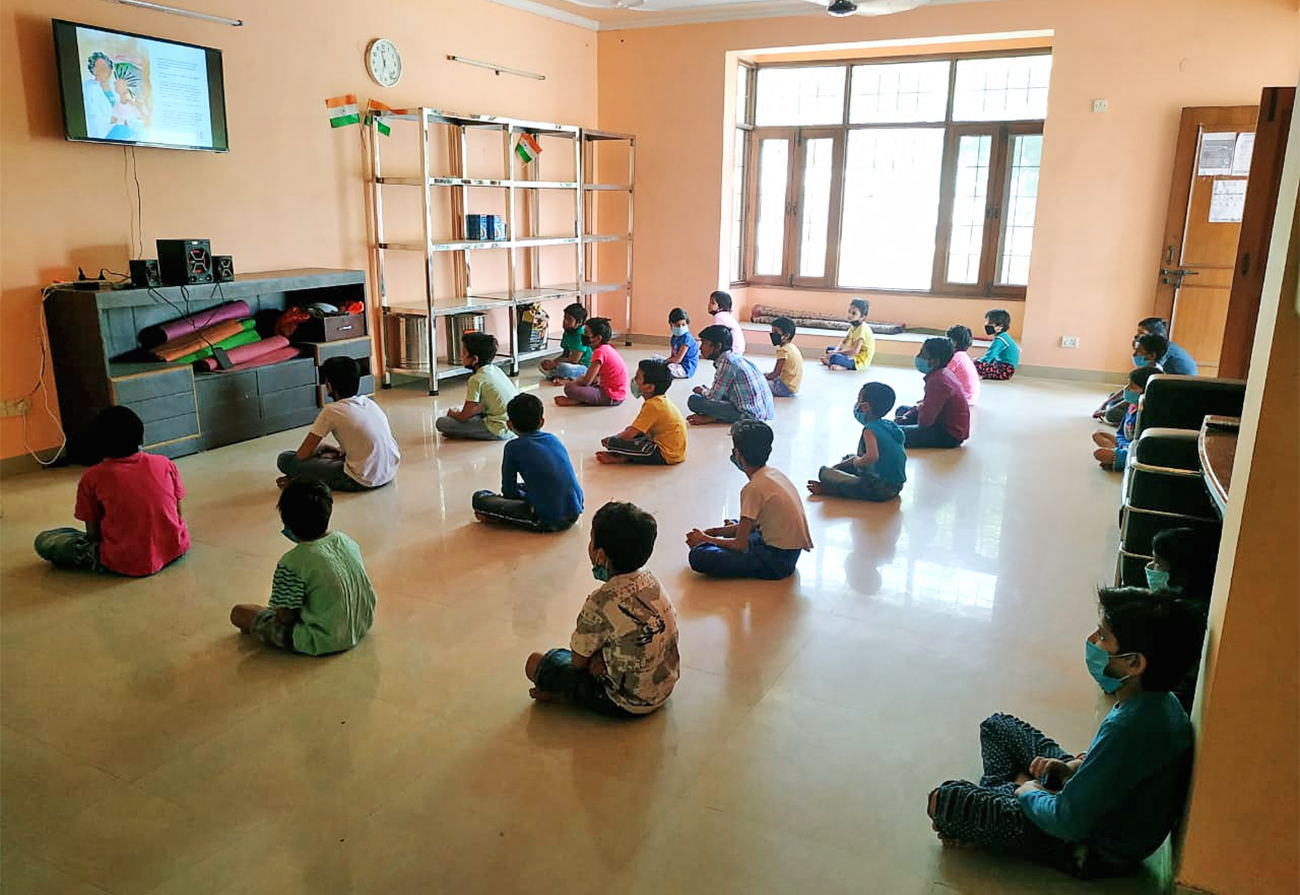
#CombatCovid19 #FarRishta initiative: Children attending an online session during the lockdown
Embed a societal perspective in key business decisions
| Initatives | Impact | SDGs |
|---|---|---|
|
Ensuring community interests are considered in business strategy through (a) continually engaging our employees across geographies to utilise their talent and resolve pressing issues faced by communities in daily life, (b) a unique and immersive experience of life in rural India for a broad cross-section of employees to see community perspectives and empathise with their issues and (c) meaningful engagement of our business ecosystem's key upstream and downstream partner organisations and their employees to enhance effectiveness of their community development initiatives |
Volunteering initiative went digital in form of #FarRishta programme due to pandemic 21,106 hours of volunteering achieved in FY 2020-21 addressing 114 social challenges 41 cities in 20 states/Union Territories of India covered through digital volunteering Our volunteering platform has been extended to 15 companies nationwide including Tata Steel BSL, TSML, TSLP, JCAPCPL and TSDPL 65,201* women children and men reached through
5,219* volunteers under digital volunteering programme. |
|